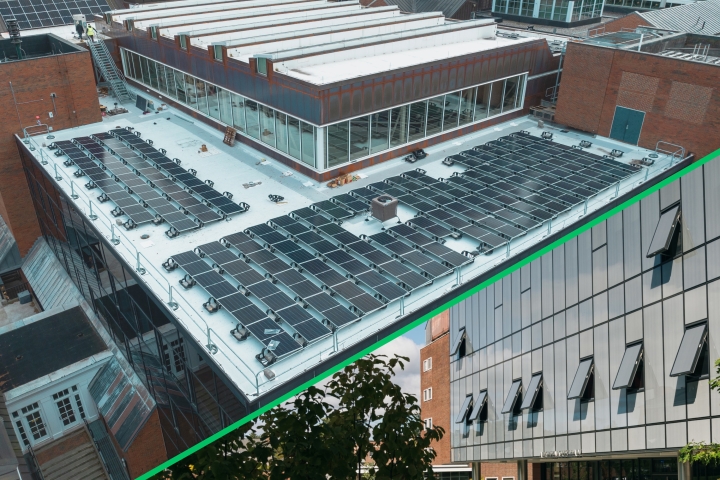The Arthur L. Irving Institute for Energy and Society has earned LEED Platinum certification, the top status a building can receive from the U.S. Green Building Council for design achievements in sustainability.
The 55,000-square-foot building, which opened in 2022, was previously recognized by the New Hampshire chapter of the American Institute of Architects with a merit award for Excellence in Architectural Design for Commercial/Institutional projects.
Dartmouth has also just received notification that another building on campus, Anonymous Hall, has received Gold certification.
The Irving Institute building incorporates a natural ventilation system that serves more than 80% of the space and allows 90% of its work areas to experience natural daylight. Other building highlights include rooftop solar panels, radiant heat, and triple-glazed windows.
The U.S. Green Building Council developed LEED, aka “Leadership in Energy and Environmental Design,” to create buildings that best address climate change, efficiency, health, and community. For a building to earn LEED certification, it must be reviewed by Green Business Certification Inc., earning points by addressing categories including water, energy, and material use, among others.
“We are pleased to get this distinguished recognition for the Irving Institute, part of Dartmouth’s continuing efforts to promote sustainability and energy efficiency across campus,” says Patrick O’Hern, senior director of project management services at Campus Services.
As part of the Dartmouth Climate Collaborative, President Sian Leah Beilock in April announced that Dartmouth will invest more than $500 million in the next five years to accelerate campus decarbonization efforts and reduce carbon emissions on campus by 60% by 2030 and 100% by 2050.
Elaine Hoffman, director of sustainability at Goody Clancy, the architecture firm that designed the Irving Institute building, says it embodies the ideas of multifaceted sustainability and solutions that the Irving Institute aims to cultivate.
“The project received all 33 out of 33 possible points in the ‘energy and atmosphere’ category,” Hoffman says. “This had always been a reach goal of the team, especially since the building is for an energy-focused institute.”
Along with high marks for optimized energy performance, the building was recognized for its renewable energy production, materials, occupant well-being and indoor environmental quality, and water efficiency.
The Irving Institute is Dartmouth’s third LEED Platinum certified building, following the Class of 1978 Life Science Center, awarded in March 2012, and the Class of 1982 Engineering and Computer Science Center, awarded in March 2023.
Other campus buildings that have received LEED certification include Andres Hall, which received LEED Gold in February, joining Dartmouth Hall, the McLaughlin Cluster Residence Halls, the Fahey-McLane Residence Hall, and the Black Family Visual Arts Center.
And Anonymous Hall, which was overhauled four years ago and is now home to the Guarini School of Graduate and Advanced Studies, has just been awarded LEED Gold certification as well, according to O’Hern.
He said Zimmerman Hall is currently being renovated but is making strides toward a likely Gold certification. Kemeny Hall and Haldeman Center as well as the Floren Varsity House have earned LEED Silver certification.

